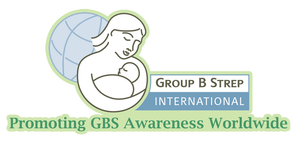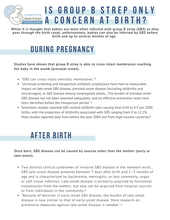Misconception: Babies move less as they grow closer to term
Fact: While the type of fetal movements may change in the third trimester, there is no evidence to support that the number of fetal movements decreases because “there is less room for your baby to move.” (1)
Misconception: GBS can’t harm babies before birth
Fact: According to the Centers for Disease Control and Prevention (CDC) in the US and several studies, GBS can cross intact membranes. (2) GBS can also cause preterm labor and preterm premature rupture of membranes. (See video presentation by Dr. David M. Aronoff.) Babies can be miscarried, stillborn, born premature or be very sick at or soon after birth due to GBS infection that began prior to birth.
Misconception: GBS stillbirths are “rare” or “very rare”
Fact: Until recently there has not been surveillance data to determine how often GBS stillbirths actually occur, pathology testing is not always done, and fetal death records are seldom updated with the final diagnosis. It is currently estimated that 57,000 possibly even up to 314,600 unborn babies die in their mother's womb or are born very sick due to GBS each year worldwide. (3, 4, 5)
Misconception: Autopsies never find a cause.
Fact: “A reasonable cause of death was identified in 99/124 pregnancies (79.84%).” (6) “Systematic review finds GBS causes up to 12.1% of stillbirths…”, (7)
Please be aware that there are other pathology testing options, besides full autopsies, which may provide answers.
Fact: While the type of fetal movements may change in the third trimester, there is no evidence to support that the number of fetal movements decreases because “there is less room for your baby to move.” (1)
Misconception: GBS can’t harm babies before birth
Fact: According to the Centers for Disease Control and Prevention (CDC) in the US and several studies, GBS can cross intact membranes. (2) GBS can also cause preterm labor and preterm premature rupture of membranes. (See video presentation by Dr. David M. Aronoff.) Babies can be miscarried, stillborn, born premature or be very sick at or soon after birth due to GBS infection that began prior to birth.
Misconception: GBS stillbirths are “rare” or “very rare”
Fact: Until recently there has not been surveillance data to determine how often GBS stillbirths actually occur, pathology testing is not always done, and fetal death records are seldom updated with the final diagnosis. It is currently estimated that 57,000 possibly even up to 314,600 unborn babies die in their mother's womb or are born very sick due to GBS each year worldwide. (3, 4, 5)
Misconception: Autopsies never find a cause.
Fact: “A reasonable cause of death was identified in 99/124 pregnancies (79.84%).” (6) “Systematic review finds GBS causes up to 12.1% of stillbirths…”, (7)
Please be aware that there are other pathology testing options, besides full autopsies, which may provide answers.
|
IS GROUP B STREP ONLY A CONCERN AT BIRTH?
|
References
- Clinical practice guideline for the management of women who report decreased fetal movements. Brisbane, July 2010.
- https://www.groupbstrepinternational.org/gbs-medical-articles-and-abstracts.html#InUtero
- World Health Organization. The neglected tragedy of stillbirths
- LR Bonetti, et al. The role of fetal autopsy and placental examination in the causes of fetal death: a retrospective study of 132 cases of stillbirths. Arch Gynecol Obstet 2011 Feb;283(2):231-41.
- C Nan, Z Dangor, CL Cutland, MS Edwards, SA Madhi, MC Cunnington. Maternal group B Streptococcus-related stillbirth: a systematic review. BJOG 2015 Oct;122(11):1437-45.
- Group B streptococcus vaccine: full value of vaccine assessment. Geneva: World Health Organization; 2021. Licence: CC BY-NC-SA 3.0 IGO
Join the Campaign against GBS Disease in babies! |
CONNECT TO GBSI |

